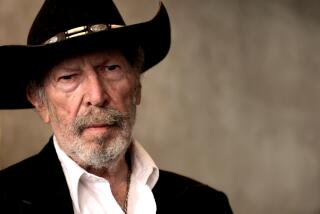Startling Conclusions by Scholar-Sleuth : Who Wrote the Bible? One Author’s Solution
Richard E. Friedman likes a good thriller. He’s a Raymond Chandler aficionado (like many other Bible scholars, it just so happens). So when he sat down after 10 years of looking into who wrote the Bible, he thought of writing his book in the style of Alfred Hitchcock.
After all, there was a fundamental mystery: Whodunit? There was a large body of clues to be examined and sorted through. The sleuth/hero could have been modeled on a renowned Bible scholar--say, Friedman’s former professor of Bible at Harvard University.
Friedman ended up scuttling the detective-fiction idea. But he adopted the pace and tone of a detective on a case. “Because that’s how I feel about scholarship,” the 41-year-old University of California, San Diego, professor said recently. “That’s how I feel when I’m doing it.”
Startling Conclusions
Friedman has reached some rather startling conclusions about the Old Testament--conclusions that some scholars may share but that run counter to popular notions. Among people of fundamentalist and orthodox views, his forthcoming book on the subject may ruffle feathers.
He concludes that certain stories are purely inventions of the authors, dictated by factional political and religious motives. One such story is the tale of the golden calf made by Aaron, which prompted Moses to smash the tablets of the Ten Commandments.
Citing extensive historical and political evidence, Friedman concluded that the story was written by a priest as an attack on the Israelite and Judean religious establishments. Both had excluded his group of priests; Friedman called the passage “a double-duty polemic.”
“For a fundamentalist Christian or an orthodox Jew, that’s troubling,” Friedman said, “because the Bible is supposed to be inerrant. It’s not supposed to be wrong. When the kid in Sunday school looks up and says, ‘Is it true?’ they say ‘Yes.’ And here’s someone else saying ‘No.’ ”
It is expected that Old Testament scholars will be most interested in Friedman’s argument that the Hebrew prophet Jeremiah, or his scribe Baruch, not only wrote the Book of Jeremiah but also was the unidentified author whom scholars call “the Deuteronomist.” Most scholars have agreed that the Deuteronomist, or his school, wrote Deuteronomy and six following books of the Bible (excluding the Book of Ruth).
Friedman also offered evidence that the writing of a Jewish priest--a document called “P” by scholars and containing many laws incorporated into the first five books of the Bible--was written prior to Deuteronomy and was criticized by Jeremiah as full of lies (Jeremiah 8:8).
Many of Friedman’s findings are to be published next week in his book, “Who Wrote the Bible?” Its strength, other scholars say, is Friedman’s persuasive marshaling of his clues and the fact that he lays them out for the general public, not merely scholars.
“For many of us, I suspect the Bible is a giant Rubic’s cube that the best minds of the Jews and Christians for more than 2,000 years have been trying to solve,” said William Propp, a visiting lecturer in Hebrew language and Biblical studies at UC San Diego. “If you can come up with a better answer to any of the problems . . . it’s an enormous achievement.”
Friedman, a professor of Hebrew and comparative literature, relied on a range of disciplines tapped by Bible scholars. They include political history, archeology, literary sensitivity and methods of linguistic analysis developed over the last 15 years.
Friedman even landed a grant to study Old Testament puns--a line of investigation that he says proved especially fruitful. It enabled him to untangle the work of two troublesome authors whose writings, interwoven, could not be separated simply by stylistic analysis.
“I thought I was going to get a Golden Fleece award for getting a grant to study puns in the Bible,” said Friedman, referring to U.S. Sen. William Proxmire’s annual prize for extravagant wastes of public money. “But it turned out to be a major piece of evidence.”
Friedman believes that all the sex scenes in the Old Testament were written by the same author--a person who Friedman says could have been a woman. He is now exploring further the writings of that author, believing he may have happened upon “the first great prose writer,” living about eight centuries before Jesus.
“I’ve discovered . . . an extraordinary, great author whose work runs through several books of the Bible,” Friedman said in an interview. “So that if I’m right in identifying that person, we would have for the first time a fairly lengthy work covering many different stories of different periods, all written by the same person. Which would mean the first great prose writer ever.”
Friedman’s interest in the Bible did not begin with curiosity about authorship.
A former seminarian, he said he was interested originally only in what the Bible said and how that affected people. Then he encountered a professor at Jewish Theological Seminary in New York in the late 1960s who “made me realize there was really greatness in it.”
Friedman left the seminary, choosing instead to become a scholar. He enrolled at Harvard University, from which he earned a doctor of theology degree in 1978. Two years earlier, he had moved to La Jolla to become UC San Diego’s only professor of biblical studies.
Since that time, he contends, the campus has become a major center in biblical studies. There are soon to be four Old Testament scholars there--a number that few centers in the United States can claim. One of the senior Bible scholars in the country, David Noel Freedman, now spends most of the year teaching at UC San Diego.
Freedman, editor of the Anchor Bible commentaries, said his colleague’s book “achieves that rare combination of serious scholarship and an eminently readable, even racy, style.”
According to Richard Friedman, Bible scholars had questioned for many centuries the tradition that the first five books of the Old Testament were written by Moses. But only in the late 19th Century did it become an accepted theory among scholars that the books were in fact composed by combining and interweaving four documents.
Perilous Position
Such views had long been controversial. Earlier proponents had had their lives threatened and their books banned, had been imprisoned and forced to convert. One 19th-Century Scottish scholar and editor of the Encyclopaedia Britannica had been tried for heresy and expelled from his academic chair.
By the 1930s, however, orthodox scholars who had participated in the debate had all but withdrawn from the field. By the time Friedman embarked on his work in the 1970s, the idea of composite authorship was well accepted among Bible scholars but there had been few books on the subject directed to the general public.
“His version is more persuasive than previously proposed syntheses,” said Propp, Friedman’s colleague at UC San Diego. Propp said Friedman’s book is especially persuasive because he analyzes not just one isolated part but a vast chunk of the Old Testament from the book of Genesis through Jeremiah.
“The main thing of the book is actually not naming the authors, though that may be what will interest people most,” Friedman said. “It’s being able to place them in history and see why they told the story this way and not that way--and occasionally, that establishes that a story in the Bible is true or that it’s not.”
As he puts it in his book, “Reading the Bible will never be quite the same.”
More to Read
Sign up for our Book Club newsletter
Get the latest news, events and more from the Los Angeles Times Book Club, and help us get L.A. reading and talking.
You may occasionally receive promotional content from the Los Angeles Times.









